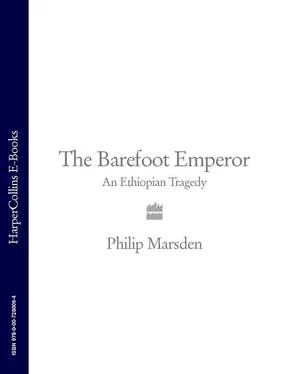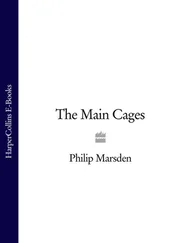He travelled to Ethiopia with another recruit, Saalmuller. With them too was the German missionary Martin Flad and his new wife, Sister Paulina. As a concession to Tewodros’s secular ambitions, they were also accompanied by a man named Schroth and his son. They were gunsmiths. In the last days of 1858 the party set out across the Egyptian desert. A long line of camels stretched behind them – thirty-two, loaded ‘mostly with Amharic Bibles and Testaments’.
The journey itself was a great excitement for young Waldmeier. He was interested in seeing Egypt because it was the land of the pharaohs and the children of Israel had lived there in exile. The desert looked like ‘a past world burned by the wrath of God’, and desert travelling was hard, he warned in his own innocent way, because ‘water is scarce’.
It became harder, and hotter. The sperm-candles in their baggage oozed through the crates and onto the flanks of the camels. Everyone but Mrs Flad fell ill, and they camped for days slumped in the heat, in the shadow of mounds of Bibles. When Schroth and his son died, the others could barely drag themselves out to scrape at the sand to bury them. They all believed that they would soon go the same way. But the Lord spared them, and soon they found themselves climbing into the highlands, surrounded by wild roses and fresh water.
At that time, in 1859, John Bell was liqemekwas , and greeted them in the royal camp. He in turn presented them to Tewodros. Waldmeier thought the emperor very civil. With great charm he asked about their journey, and expressed regret that Schroth and his son had died on the road.
‘It is on account of my sins,’ Tewodros told the missionaries, ‘that God took these two men away from me.’
Tewodros sent them to Meqdela. It was for their own safety. Theophilus Waldmeier settled easily into his new mountaintop home. He shared a hut with five of the other missionaries, studied Amharic and taught some basic mechanical skills. There were long debates about the Bible with the royal scribe Debtera Zeneb, who in time came to see the true light of the Gospel.
Waldmeier was delighted by the country of his calling. After the rains, he wrote, the entire land turned into ‘a beautiful flower garden’. The people were ‘nice-looking’ and ‘clever in everything when taught’. Like Plowden before him, he dreamed of Ethiopia’s development, of its prospects if it could ‘only have good government, and its own old sea-port of Massowah’. He believed too in Tewodros’s good intentions. ‘Where is another king to be found, who in spite of his power and greatness in self-denial disdains all comforts, luxury and good living – he lives very poorly, while he rewards and gives royally – who in living trust in God’s help lays before his feet heathen and wild nations?’
In turn, Waldmeier came to the attention of Tewodros early on by repairing some of his great store of broken muskets.
By December, Waldmeier had even married into his family. Among the community on top of Meqdela was Tewodros’s cousin Wurqnesh, the wife of John Bell. Waldmeier married their eldest daughter, Sarah (Saalmuller later married her sister). For the wedding Tewodros sent Waldmeier an ornamental saddle embroidered with gold thread, a silk shirt of rank, eighty oxen and five hundred sheep. The feast continued for a whole week.
But Waldmeier felt Meqdela was too isolated for their evangelical work. He told his father-in-law, John Bell, that they needed to establish a mission. Tewodros gave them Gefat, a small hill a little to the north of his capital at Debre Tabor. Plowden had lived here for a while. It was a beautiful place. Accounts of the early days at Gefat, with the young families clearing brush to build lodgings and huts, opening a school for children of the poor, shine with a pioneer zeal.
In time Gefat became a great centre of technical skills. The missionaries built a water wheel. Tewodros sent hundreds of people there for instruction – ‘all the clever men of Abyssinia were brought thither by order of the king’. Tewodros himself paid visits more and more frequently. ‘I often sat for hours with the king,’ wrote Waldmeier, ‘engaged in religious conversation and speaking about the welfare of his country and its people.’
Then John Bell was killed and Tewodros’s world grew darker. The high-minded conversations became less frequent and the emperor made it clear what he wanted from the missionaries at Gefat. He wanted them to build guns, bigger and bigger guns.
16
Tewodros first tried to build artillery before he became emperor, during a campaign against Ras Ali. He hollowed out a log, coiled wire around the outside and filled it with stone shot. It wasn’t a great success. His victories enabled him to capture a few cannon. He received four more from Said Pasha, but other gifts of guns tended to be seized by the Turkish governor at Massawa. Lacking a coastline, Tewodros realised that if he was to have proper artillery, he would have to make it.
In 1861 a man named Monsieur Jaquin arrived in Ethiopia, and word spread that this Frenchman was something of an expert in metal casting. Tewodros sent him an order: Go to the community of Gefat, where Theophilus Waldmeier and the Protestant missionaries will assist you in casting a cannon. In turn he told the missionaries that they must provide Jaquin with all the materials he required. They must organise labour for him and support him in every way in the construction of ‘deadly weapons’.
‘We could make no objection to this,’ wrote the ever-forgiving Waldmeier.
Jaquin arrived and the missionaries recruited hundreds of workers. Some were despatched with mules to the iron mines. Others collected boulders of tufa to be broken and graded. Within days the walls of a blast furnace began to rise on the small knoll of Gefat. Ox-hides were sewn together to make bellows. Charcoal was burnt, and Jaquin inspected the work with some anxiety. The day came when he decided that it was complete, and a great crowd gathered to watch.
The furnace was lit. The bellows pumped. Blasts of air shot through the clay tuyère. The fire inside flickered, then whooshed into life. Nervously Jaquin stood watching. The fat leather lungs swelled … emptied … swelled … emptied … The temperature climbed higher. The ore inside took on a yellowish glow. Still the bellows worked. The heat rose still further, the ore glowed brighter – and then, very slowly, the outer walls of the furnace began to crumble.
‘The Frenchman,’ observed Waldmeier, ‘began to lament and weep; he went half-mad, cried wildly and finally asked the king’s permission to leave. After obtaining it he left the land.’
Some time later, Tewodros himself came to Gefat. He summoned the missionaries. He told them they must carry on with the work of Jaquin, and endeavour to forge a large gun.
‘Your Majesty,’ they said with all due tact, ‘we have neither knowledge nor experience in this matter, and are quite ignorant of it, and we are afraid to try what is above our strength.’
‘That does not matter,’ replied Tewodros. ‘If you are my friends, then try. If God allows it to succeed, it will be well; if not, it also will be well.’
They found that no argument could be made against that statement. Before leaving, Tewodros encouraged them by ordering their servants to be imprisoned. Waldmeier and the others came together to discuss the matter. Building guns to terrorise the people was not what Gobat had in mind when he sent them out. But they agreed that the work of the Gefat mission – the school, the informal teaching they dispensed to the hundreds of workers – was of great value. They must obey Tewodros. But how? They prayed for guidance. They debated. They prayed again. They tried to remember all that Jaquin had talked about. They made several attempts at rebuilding the blast furnace with stronger walls. All failed. They did not know what to do – and also all their servants were locked up. The missionaries agreed that they should go to the emperor and explain to him that they were willing to undertake any work for him, anything – building of roads and bridges, teaching – but not casting metal. It was too difficult.
Читать дальше












